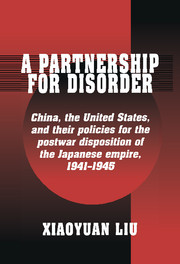 A Partnership for Disorder
A Partnership for Disorder Book contents
- Frontmatter
- Contents
- Acknowledgments
- Note on romanization
- Abbreviations
- Introduction
- 1 The making of an alliance
- 2 The issue of postwar Japan
- 3 China's lost territories
- 4 Korea's independence
- 5 The road to Cairo
- 6 A divisive summit
- 7 Yan'an and postwar East Asia
- 8 Diplomacy without action
- 9 Erosion of a partnership
- 10 The Manchurian triangle
- 11 Bargaining at Moscow
- 12 Epilogue: The crisis of peace
- Appendix I Guiding Plan for Helping the Korean Restoration Movement
- Appendix II Two Chinese documents of the Cairo Conference
- Bibliography
- Index
8 - Diplomacy without action
Published online by Cambridge University Press: 20 October 2009
- Frontmatter
- Contents
- Acknowledgments
- Note on romanization
- Abbreviations
- Introduction
- 1 The making of an alliance
- 2 The issue of postwar Japan
- 3 China's lost territories
- 4 Korea's independence
- 5 The road to Cairo
- 6 A divisive summit
- 7 Yan'an and postwar East Asia
- 8 Diplomacy without action
- 9 Erosion of a partnership
- 10 The Manchurian triangle
- 11 Bargaining at Moscow
- 12 Epilogue: The crisis of peace
- Appendix I Guiding Plan for Helping the Korean Restoration Movement
- Appendix II Two Chinese documents of the Cairo Conference
- Bibliography
- Index
Summary
Symbolically, the summit at Cairo formalized Chongqing's partnership with the Western Allies in prosecuting the war and in planning for peace. Practically, however, the Cairo Conference did not result in the definite American–Chinese alliance sought by the KMT leadership. At Cairo, exposure of the difficulties in Chongqing's relations with the Allies did not result in the alteration of Chiang Kai-shek's attitude toward cooperation with the United States. Actually, the experience only made him more anxious than ever to maintain the momentum of the wartime Chinese–American partnership. Nevertheless, the anticlimax of the Chongqing–Washington military cooperation in war came in 1944. In that summer, amid the KMT regime's military disaster inflicted by Japan's new offensive, the U.S. government pressed Chiang Kai-shek to delegate the command of the Chinese Army to General Joseph Stilwell. Chiang's stubborn resistance to the pressure eventually resulted in Stilwell's departure from the China theater. The Stilwell affair showed Chiang's intractable character whenever he sensed a threat to his power. Yet, strangely, Chiang's defense of his sovereign status in the command crisis unfolded along with Chongqing's retreat on the diplomatic front as far as postwar East Asia was concerned. When President Roosevelt saw no other choice but to recall General Stilwell from China, the State Department realized that in international affairs Chongqing was becoming more manageable than before.
- Type
- Chapter
- Information
- A Partnership for DisorderChina, the United States, and their Policies for the Postwar Disposition of the Japanese Empire, 1941–1945, pp. 175 - 201Publisher: Cambridge University PressPrint publication year: 1996
